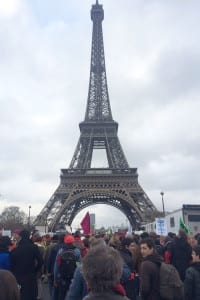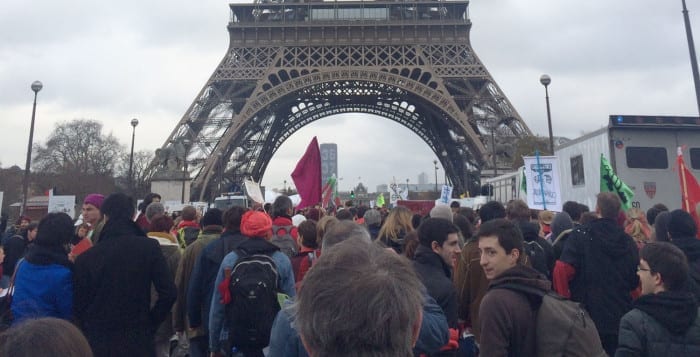By Emma Collin

It’s the morning of Dec. 12 as I hurriedly make my way across Paris. Today will be my first real engagement with civil disobedience. Under a broad state of emergency, French President François Hollande has banned demonstrations, which the state defines as “more than two people sharing a political message.” In the weeks leading up to today, citizens who publicly criticized the egregiously dangerous deal brewing in the 21st United Nations Conference of the Parties climate talks were confronted with state-sanctioned violence, tear gas, and arrest. I emerge from the metro and scan the scene. Imposing graffiti on the bank of the Seine River nearby reads “L’état d’urgences pour faire oublier les tas d’urgences,” or “A state of emergency to ensure other emergencies are forgotten”.
Let’s back up. From Nov. 30 to Dec. 12, the United Nations Framework Convention on Climate Change convened heads of state in an old airport hanger in a suburb north of Paris. World leaders were tasked with drafting and signing a binding agreement that would prevent the most catastrophic effects of climate change. COP21 comes after years of unproductive conversation around climate; e.g. the notorious COP15 in Copenhagen 2009 produced only a vague document with no legal standing.
After an emotional and exhausting two weeks, not to mention an extended deadline and a few all-nighters, a deal heralded by most major news outlets as “historic” and “groundbreaking” was signed.
In many ways, the deal is historic. World leaders unanimously signing a deal at all signals progress. This forward movement is undoubtedly a testament to grassroots power built by communities around the world who are demanding action — for example, the more than 400,000 people who took to the streets of New York City last September for the People’s Climate March.

While acknowledging that victory, here are some things you should understand about the Paris climate accord. For one, it is functionally unenforceable. Emission reductions are based on voluntary commitments by each nation. To adhere to the desperately needed 1.5°C warming limit that appears repeatedly in the document’s text, we need to stop extracting and burning fossil fuels almost immediately. Instead, the tangible commitments to emission-reduction lock us into 3.0°C warming or more, which spells catastrophe, especially for the global south. Furthermore, language on indigenous and human rights were stripped completely from the body of the document. The words “fossil fuels,” “coal,” or “oil” don’t appear once.
One of the most debated and divisive sections of the document is called “loss and damage.” It outlines the idea that compensation should be paid to vulnerable states to aid adaptation to climate change. In a predictable move, representatives of developed countries like the United States fought hard to make this section non-binding. This strips poor nations — those already feeling the brunt of the consequences of climate change despite a historically negligible contribution to emissions — of any mechanism for claiming damages or compensation. Contrast this with international free trade agreements, which give corporations concrete mechanisms to sue nations for projected loss of profits. I know this deal is inadequate, and I know others know it too.
So when I exit the metro on Dec. 12 and quietly walk past swarms of Parisian police officers in full riot gear, I find myself in a crowd 15,000 people. I stand with people peacefully singing and chanting and defying a protest ban because they understand that we can do better. I stand next to my family and fellow delegates of Gulf South Rising, an inspirational group of community and indigenous leaders from the five southern states on the Gulf of Mexico, who are uniting to build just economic, political, and energy systems that heal their communities. And I stand with the understanding that what happened this month is just the beginning — that we must operate from a framework of resistance where we demand the healthy and safe communities we know we deserve.
The Paris Climate Accord will not get us there, but with world leaders committing, however theoretically, to action, it is a tool we can leverage as we continue this fight.
Emma Collin, a Centerport native, graduated from Harborfields High School. She recently moved to New Orleans, La., and is a senior project manager at Gulf Coast Center for Law & Policy and a community organizer with Gulf South Rising.





